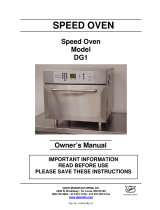
SAFETY INSTRUCTIONS
Safety Instructions
Strictly adhere to the following safety precautions to reduce the risk of burns, electric shock, fire, injury, damage to
oven or property near oven, or possible exposure to excessive microwave energy.
General Safety Information
a
Read all instructions before using this appliance.
a
Read and follow the specific “Precautions to Avoid Possible Exposure to Excessive Microwave Energy” found on
page ii.
a
This appliance must be grounded. Connect only to properly grounded outlet. See “Grounding Instructions” found
on page ii.
a
Install or locate this appliance only in accordance with the provided installation instructions.
a
Some products such as whole eggs and sealed containers (e.g., closed glass jars) may explode and should not be
heated in this oven.
a
Use this appliance only for its intended uses as described in this manual.
a
This appliance should be serviced only by qualified service personnel. Contact the nearest authorized service facility
for examination, repair, or adjustment.
a
Keep the cord away from heated surfaces.
a
Use only utensils suitable for use with microwave ovens.
a
The contents of feeding bottles and baby food jars must be stirred or shaken and the temperature checked before
consumption, in order to avoid burns.
a
Liquids, such as water, coffee, or tea are able to be overheated beyond the boiling point without appearing to be
boiling. Visible bubbling or boiling when the container is removed from the microwave oven is not always
present. THIS COULD RESULT IN VERY HOT LIQUIDS SUDDENLY BOILING OVER WHEN THE
CONTAINER IS DISTURBED OR A UTENSIL IS INSERTED INTO THE LIQUID.
a
This appliance is not to be used by children or persons with reduced physical, sensory or mental capabilities, or lack
of experience and knowledge, unless they have been given supervision or instruction.
X
allow children to use this appliance. Children should be supervised to ensure that they do not play with the
appliance.
X
use corrosive chemicals or vapors in this appliance - it is not designed for industrial or laboratory use.
X
operate this appliance if it has a damaged cord or plug, is not working properly, or has been damaged or
dropped. See “Power Cord Replacement” found on page ii.
X
cover or block any openings on this appliance.
X
store this appliance outdoors.
X
use this product near water (e.g., near a kitchen sink, in a wet basement, near a swimming pool).
X
immerse the cord or plug in water.
X
let the cord hang over the edge of a table or counter.
X
use a water jet for cleaning. See “Daily Maintenance” (pages 7-9) for proper cleaning procedures.
Reducing Fire Risk
a
Remove wire twist-ties from paper or plastic bags used to facilitate cooking in the oven.
a
If materials inside the oven ignite, keep the oven door closed, turn the oven off, and disconnect the power cord or
shut off power at the fuse or circuit breaker panel.
a
If smoke is observed, switch off or unplug the oven. Keep the door closed to stifle any flames.
X
use the cook cavity for storage purposes (e.g., leaving paper products, cooking utensils, or food in the cavity
when not in use).
X
overcook food. Carefully attend to the oven if paper, plastic, or other combustible materials are placed
inside the oven to facilitate cooking.
i






















